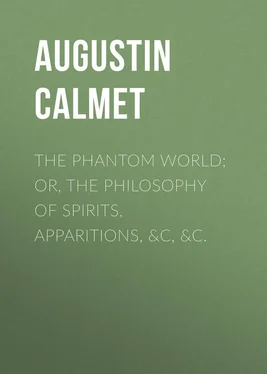Augustin Calmet - The Phantom World; or, The philosophy of spirits, apparitions, &c, &c.
Здесь есть возможность читать онлайн «Augustin Calmet - The Phantom World; or, The philosophy of spirits, apparitions, &c, &c.» — ознакомительный отрывок электронной книги совершенно бесплатно, а после прочтения отрывка купить полную версию. В некоторых случаях можно слушать аудио, скачать через торрент в формате fb2 и присутствует краткое содержание. Жанр: foreign_antique, foreign_prose, на английском языке. Описание произведения, (предисловие) а так же отзывы посетителей доступны на портале библиотеки ЛибКат.
- Название:The Phantom World; or, The philosophy of spirits, apparitions, &c, &c.
- Автор:
- Жанр:
- Год:неизвестен
- ISBN:нет данных
- Рейтинг книги:3 / 5. Голосов: 1
-
Избранное:Добавить в избранное
- Отзывы:
-
Ваша оценка:
- 60
- 1
- 2
- 3
- 4
- 5
The Phantom World; or, The philosophy of spirits, apparitions, &c, &c.: краткое содержание, описание и аннотация
Предлагаем к чтению аннотацию, описание, краткое содержание или предисловие (зависит от того, что написал сам автор книги «The Phantom World; or, The philosophy of spirits, apparitions, &c, &c.»). Если вы не нашли необходимую информацию о книге — напишите в комментариях, мы постараемся отыскать её.
The Phantom World; or, The philosophy of spirits, apparitions, &c, &c. — читать онлайн ознакомительный отрывок
Ниже представлен текст книги, разбитый по страницам. Система сохранения места последней прочитанной страницы, позволяет с удобством читать онлайн бесплатно книгу «The Phantom World; or, The philosophy of spirits, apparitions, &c, &c.», без необходимости каждый раз заново искать на чём Вы остановились. Поставьте закладку, и сможете в любой момент перейти на страницу, на которой закончили чтение.
Интервал:
Закладка:
St. Augustine 95 95 Aug. tom. viii. pp. 28, 284.
assures us that the Manichæans regarded the serpent as the Christ, and said that this animal had opened the eyes of Adam and Eve by the bad counsel which he gave them. We almost always see the form of the serpent in the magical figures 96 96 Ab-racha , pater mali , or pater malus .
Akraxas and Abrachadabra , which were held in veneration among the Basilidian heretics, who, like the Manichæans, acknowledge two principles in all things – the one good, the other bad; Abraxas in Hebrew signifies that bad principle , or the father of evil; ab-ra-achad-ab-ra , the father of evil , the sole father of evil , or the only bad principle.
St. Augustine 97 97 August. de Gen. ad Lit. 1. ii. c. 18.
remarks that no animal has been more subject to the effects of enchantment and magic than the serpent, as if to punish him for having seduced the first woman by his imposture.
However, the demon has usually assumed the human form when he would tempt mankind; it was thus that he appeared to Jesus Christ in the desert; 98 98 Matt. iv. 9, 10, &c.
that he tempted him and told him to change the stones into bread that he might satisfy his hunger; that he transported him, the Saviour, to the highest pinnacle of the temple, and showed him all the kingdoms of the world, and offered him the enjoyment of them.
The angel who wrestled with Jacob at Peniel, 99 99 Gen. xxxii. 24, 25.
on his return from his journey into Mesopotamia, was a bad angel, according to some ancient writers; others, as Severus Sulpicius 100 100 Sever. Sulpit. Hist. Sac.
and some Rabbis, have thought that it was the angel of Esau, who had come to combat with Jacob; but the greater number believe that it was a good angel. And would Jacob have asked him for his blessing had he deemed him a bad angel? But however that fact may be taken, it is not doubtful that the demon has appeared in a human form.
Several stories, both ancient and modern, are related which inform us that the demon has appeared to those whom he wished to seduce, or who have been so unhappy as to invoke his aid, or make a compact with him, as a man taller than the common stature, dressed in black, and with a rough ungracious manner; making a thousand fine promises to those to whom he appeared, but which promises were always deceitful, and never followed by a real effect. I can even believe that they beheld what existed only in their own confused and deranged ideas.
At Molsheim, 101 101 A small city or town of the Electorate of Cologne, situated on a river of the same name.
in the chapel of St. Ignatius in the Jesuits' church, may be seen a celebrated inscription, which contains the history of a young German gentleman, named Michael Louis, of the house of Boubenhoren, who, having been sent by his parents when very young to the court of the Duke of Lorraine, to learn the French language, lost all his money at cards: reduced to despair, he resolved to give himself to the demon, if that bad spirit would or could give him some good money; for he doubted that he would only furnish him with counterfeit and bad coin. As he was meditating on this idea, suddenly he beheld before him a youth of his own age, well made, well dressed, who, having asked him the cause of his uneasiness, presented him with a handful of money, and told him to try if it was good. He desired him to meet him at that place the next day.
Michael returned to his companions, who were still at play, and not only regained all the money he had lost, but won all that of his companions. Then he went in search of his demon, who asked as his reward three drops of his blood, which he received in an acorn-cup; after which, presenting a pen to Michael, he desired him to write what he should dictate. He then dictated some unknown words, which he made him write on two different bits of paper, 102 102 There were in all ten letters, the greater part of them Greek, but which formed no (apparent) sense. They were to be seen at Molsheim, in the tablet which bore a representation of this miracle.
one of which remained in the possession of the demon, the other was inserted in Michael's arm, at the same place whence the demon had drawn the blood. And the demon said to him, "I engage myself to serve you during seven years, after which you will unreservedly belong to me."
The young man consented to this, though with a feeling of horror; and the demon never failed to appear to him day and night under various forms, and taught him many unknown and curious things, but which always tended to evil. The fatal termination of the seven years was approaching, and the young man was then about twenty years old. He returned to his father's house, when the demon to whom he had given himself inspired him with the idea of poisoning his father and mother, of setting fire to their château, and then killing himself. He tried to commit all these crimes, but God did not allow him to succeed in these attempts. The gun with which he wished to kill himself missed fire twice, and the poison did not take effect on his father and mother.
More and more uneasy, he revealed to some of his father's domestics the miserable state in which he found himself, and entreated them to procure him some succor. At the same time the demon seized him, and bent his body back, so that he was near breaking his bones. His mother, who had adopted the heresy of Suenfeld, and had induced her son to follow it also, not finding in her sect any help against the demon that possessed or obseded him, was constrained to place him in the hands of some monks. But he soon withdrew from them and retired to Islade, from whence he was brought back to Molsheim by his brother, a canon of Wurzburg, who put him again into the hands of fathers of the society. Then it was that the demon made still more violent efforts against him, appearing to him in the form of ferocious animals. One day, amongst others, the demon, wearing the form of a hairy savage, threw on the ground a schedule, or compact, different from the true one which he had extorted from the young man, to try by means of this false appearance to withdraw him from the hands of those who kept him, and prevent his making his general confession. At last they fixed on the 20th of October, 1603, as the day for being in the Chapel of St. Ignatius, and to cause to be brought the true schedule containing the compact made with the demon. The young man there made profession of the Catholic and orthodox faith, renounced the demon, and received the holy sacrament. Then, uttering horrible cries, he said he saw as it were two he-goats of immeasurable size, which, holding up their forefeet (standing on their hindlegs), held between their claws, each one separately, one of the schedules or agreements. But as soon as the exorcisms were begun, and the priests invoked the name of St. Ignatius, the two he-goats fled away, and there came from the left arm or hand of the young man, almost without pain, and without leaving any scar, the compact, which fell at the feet of the exorcist.
There now wanted only the second compact, which had remained in the power of the demon. They recommenced their exorcisms, and invoked St. Ignatius, and promised to say a mass in honor of the saint; at the same moment there appeared a tall stork, deformed and badly made, who let fall the second schedule from his beak, and they found it on the altar.
The pope, Paul V., caused information of the truth of these facts to be taken by the commissionary-deputies, M. Adam, Suffragan of Strasburg, and George, Abbot of Altorf, who were juridically interrogated, and who affirmed that the deliverance of this young man was principally due, after God, to the intercession of St. Ignatius.
Читать дальшеИнтервал:
Закладка:
Похожие книги на «The Phantom World; or, The philosophy of spirits, apparitions, &c, &c.»
Представляем Вашему вниманию похожие книги на «The Phantom World; or, The philosophy of spirits, apparitions, &c, &c.» списком для выбора. Мы отобрали схожую по названию и смыслу литературу в надежде предоставить читателям больше вариантов отыскать новые, интересные, ещё непрочитанные произведения.
Обсуждение, отзывы о книге «The Phantom World; or, The philosophy of spirits, apparitions, &c, &c.» и просто собственные мнения читателей. Оставьте ваши комментарии, напишите, что Вы думаете о произведении, его смысле или главных героях. Укажите что конкретно понравилось, а что нет, и почему Вы так считаете.












